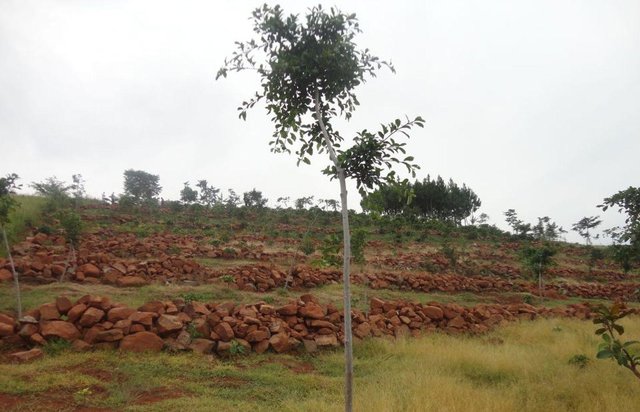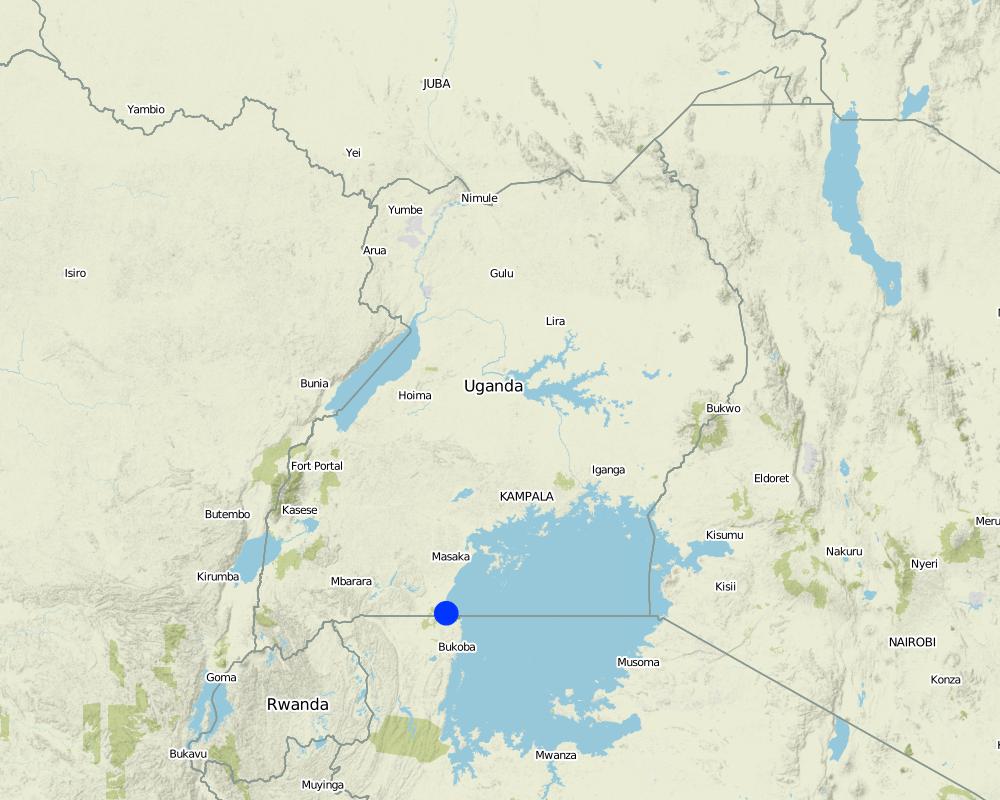FFS/SLM Community Initiative [Uganda]
- Criação:
- Atualização:
- Compilador/a: Wilson Bamwerinde
- Editor: –
- Revisor: Fabian Ottiger
Farmer Field School
approaches_2487 - Uganda
Veja as seções
Expandir tudo Recolher tudo1. Informação geral
1.2 Detalhes do contato das pessoas capacitadas e instituições envolvidas na avaliação e documentação da abordagem
1.3 Condições em relação ao uso da informação documentada através de WOCAT
Quando os dados foram compilados (no campo)?
13/12/2013
O/a compilador/a e a(s) pessoa(s) capacitada(s) aceitam as condições relativas ao uso de dados documentados através da WOCAT:
Sim
1.4 Referência ao(s) questionário(s) sobre tecnologias da GST

Stone lines [Uganda]
Stone lines are built along a contour to control soil erosion on a degraded steep slope.
- Compilador/a: Wilson Bamwerinde
2. Descrição da abordagem de GST
2.1 Descrição curta da abordagem
Farmers are organized to promote adoption of sustainable land management best practices within the community
2.2 Descrição detalhada da abordagem
Descrição detalhada da abordagem:
Aims / objectives: To train farmers in land based technologies that improve productivity, land management and are resilient to climate changes
Methods: Planning meetings, agro-ecosystem analysis (AESA), farmer-to-farmer visits, monitoring and evaluation
Stages of implementation: Farmer Field School (FFS) formation to bring together 30 farmers from a catchment area; training in group dynamics; training in best practices to address land degradation problems; AESA; and action planning
Role of stakeholders: District facilitators: Facilitation of FFS formation, training of trainers for AESA, drawing village land use plans, prioritizing enterprises/challenges, making technical recommendations; Local leaders: Passing and implementing bye-laws.
2.5 País/região/locais onde a abordagem foi aplicada
País:
Uganda
Região/Estado/Província:
Uganda
Especificação adicional de localização:
Kijonjo, Katongero, Rakai District
Map
×2.6 Datas de início e término da abordagem
Indique o ano de início:
2011
Ano de término (caso a abordagem não seja mais aplicada):
2015
2.7 Tipo de abordagem
- Baseado em projeto/programa
2.8 Principais metas/objetivos da abordagem
The Approach focused on SLM only (Sustainable Land Management Farmer Cooperative)
To share knowledge, skills and information on establishment of local best practices to improve productivity and biodiversity and reduce soil erosion
The SLM Approach addressed the following problems: Low soil nutrient levels, vegetation loss and soil erosion on steep slopes
2.9 Condição que propiciam ou inibem a implementação de tecnologia/tecnologias aplicada(s) segundo a abordagem
Disponibilidade/acesso a recursos e serviços financeiros
- Inibitivo
Inadequate resources because farming is mainly subsistent
Treatment through the SLM Approach: Farmers formed cooperatives to pool resources
Conhecimento sobre GST, acesso a suporte técnico
- Inibitivo
Little available information on addressing land management issues
Treatment through the SLM Approach: Trained facilitators were sourced to provide appropriate knowledge to address relevant constraints
Carga de trabalho, disponibilidade de força de trabalho
- Inibitivo
Increased workload required in the implementation caused expenses on hired labor to rise.
Treatment through the SLM Approach: Sharing workload through working together to dig up stones and carry them on steep slopes, lay them along contours and plant Ficus natalensis to stabilize the soil
3. Participação e papel das partes interessadas envolvidas
3.1 Partes interessadas envolvidas na abordagem e seus papéis
- Usuários de terra/comunidades locais
Women constitute the majority of farmers in attendance because most agricultural production in the district is carried out by women, except in cattle-keeping areas where men are the majority
- Especialistas em GST/ consultor agrícola
- Governo local
District facilitators were provided by the district local government
- Governo nacional (planejadores, responsáveis pelas decisões)
Collaboration with the line Central Government Ministries through the Project Steering Committee at Permanent Secretary level
- Organização internacional
Kagera TAMP (FAO-GEF) provided funding for specialist facilitators
Caso várias partes interessadas foram envolvidas, indique a agência líder:
Kagera TAMP international specialists with the help of national FFS specialists
3.2 Envolvimento do usuários de terra/comunidades locais nas diferentes fases da abordagem
| Envolvimento do usuários de terra/comunidades locais | Especifique quem estava envolvido e descreva as atividades | |
|---|---|---|
| Iniciação/motivação | Participativo | FFS specialist facilitator with prospective FFS members to get farmers organized in FFS (30 members each) |
| Planejamento | Participativo | Farmers in their farmer field schools sketched watershed maps and developed action plans with the help of district facilitators |
| Implementação | Participativo | Facilitators helped FFS members in the dynamics that sustained and strengthened the Approach |
| Monitoramento/avaliação | Passivo | A few members were co-opted to the monitoring team which comprised local government facilitators, Kagera TAMP Project specialists and the central government Project Steering Committee |
| Research | Participativo | FFS members carried out Agro-ecosystem Analysis (AESA) with training and field support from specialists |
3.4 Decisão sobre a seleção de tecnologia/tecnologias de GST
Especifique quem decidiu sobre a seleção de tecnologia/tecnologias a serem implementadas:
- Principalmente usuários da terra, apoiados por especialistas em GST
Explique:
The FFS concept and methodology were introduced to the farmers by SLM specialists. The decisions on technology choice were the result of discussions bf the farmers with support from the specialists.
Decisions on the method of implementing the SLM Technology were made by mainly by land users supported by SLM specialists. Farmers in the FFS decided how to overcome constraints posed by their hilly terrain and high cost of labor
4. Suporte técnico, reforço das capacidades e gestão do conhecimento
4.1 Reforço das capacidades/ formação
Foi oferecida formação aos usuários da terra/outras partes interessadas?
Sim
Especifique quem foi capacitado:
- Usuários de terra
- Equipe de campo/consultores
- Politicians/Policy Makers
Tipo de formação:
- Em exercício
- Agricultor para agricultor
- Áreas de demonstração
- Reuniões públicas
Assuntos abordados:
Extension Training: use of demonstration plots and AESA to experiment and discover the appropriate methodology for implementation of SLM technologies. A formal session involves a facilitator and farmers. The facilitator guides the farmers on how to investigate a problem using marker-drawn sketches on flip chart. Observations, conclusions and recommendations are reached in a participatory manner.
Extension: FFS members adopt a resolution to carry out the recommended procedures/activities; community members are free to interact with FFS members on field days and copy recommendations. Farmer-to-farmer visits are encouraged and promoted to extend information.
Research: FFS members research together on a given problem/challenge such as soil fertility and arrive at recommendations together. They are guided by facilitators from government or government research institutions with collaborative support from Kagera TAMP/FAO project.
Importance of land use rights: Ownership of land affects land management practices. The attitude towards the recommendation by farmers is usually determined by the FFS members. In Kagera TAMP districts land ownership is customary but the right to use land is governed by national laws.
Incentives:
Labor: Farmer Field School members provide the labor to implement technologies. Hired labor may also be used.
Inputs: Farmers provide the basic tools such as hoes, pick axe etc. Seedlings and seeds may be provided by the project.
Credit: Small amounts may be acquired from the FFS cooperative savings.
4.3 Fortalecimento da instituição (desenvolvimento organizacional)
As instituições foram fortalecidas ou estabelecidas através da abordagem?
- Sim, significativamente
Especifique a que nível (níveis) as instituições foram fortalecidas ou estabelecidas:
- Local
Especifique o tipo de apoio:
- Reforço das capacidades/ formação
- Equipamento
Dê mais detalhes:
Training workshops in Sustainable Land Management (SLM) and Land Degradation Assessment (LADA) both national and international, seminars, and procurement and training in the use of computers, digital cameras and GPS units
4.4 Monitoramento e avaliação
Monitoramento e avaliação são partes da abordagem?
Sim
Comentários:
bio-physical aspects were regular monitored by project staff, government, land users through observations; indicators: Measurement of crop yield, soil nutrients, biodiversity
bio-physical aspects were regular monitored by project staff, government, land users through measurements; indicators: Measurement of crop yield, soil nutrients, biodiversity
economic / production aspects were regular monitored by government, land users through observations; indicators: Measurement of crop yield, vigor
economic / production aspects were regular monitored by government through measurements; indicators: Measurement of crop yield, vigor
area treated aspects were regular monitored by project staff, government through observations; indicators: Measure by attendance, morale
area treated aspects were regular monitored by project staff, government through measurements; indicators: Measure by attendance, morale
no. of land users involved aspects were regular monitored by project staff through observations; indicators: None
no. of land users involved aspects were regular monitored by project staff through measurements; indicators: None
management of Approach aspects were None monitored by project staff through observations; indicators: None
management of Approach aspects were None monitored by project staff through measurements; indicators: None
There were few changes in the Approach as a result of monitoring and evaluation: FFS constantly refines and improves on what and how to achieve objectives, to discover and archive best practices in the most effective forms possible
There were few changes in the Technology as a result of monitoring and evaluation: Height of stone lines, width between lines
4.5 Pesquisa
A pesquisa foi parte da abordagem?
Sim
Especifique os tópicos:
- Ecologia
Dê mais detalhes e indique quem realizou a pesquisa:
Agro-ecosystem Analysis (AESA) by FFS members
Research was carried out on-farm
5. Financiamento e apoio material externo
5.1 Orçamento anual para o componente de GST da abordagem
Caso o orçamento exato seja desconhecido, indique a faixa:
- < 2.000
Comentários (p. ex. principais fontes de recursos/principais doadores):
Approach costs were met by the following donors: international (Kagera TAMP): 18.95%; local government (district, county, municipality, village etc) (District and Sub-county facilitator time): 11.14%; local community / land user(s) (Land users as FFS members): 69.91%
5.2 Apoio financeiro/material concedido aos usuários da terra
Os usuários da terra receberam apoio financeiro/material para a implementação de tecnologia/tecnologias?
Não
5.3 Subsídios para entradas específicas (incluindo mão-de-obra)
Se a mão-de-obra pelos usuários da terra foi uma entrada substancial, isso foi:
- Voluntário
Comentários:
FFS members were facilitated with information and they carried out the approach without any financial or material support
5.4 Crédito
Foi concedido crédito segundo a abordagem para atividades de GST?
Não
6. Análise de impactos e declarações finais
6.1 Impactos da abordagem
A abordagem auxiliou os usuários da terra a implementar e manter as tecnologias de GST?
- Não
- Sim, pouco
- Sim, moderadamente
- Sim, significativamente
Formerly disused land was made productive
Did other land users / projects adopt the Approach?
- Não
- Sim, pouco
- Sim, moderadamente
- Sim, significativamente
Did the Approach lead to improved livelihoods / human well-being?
- Não
- Sim, pouco
- Sim, moderadamente
- Sim, significativamente
Crop diversification, food security
Did the Approach help to alleviate poverty?
- Não
- Sim, pouco
- Sim, moderadamente
- Sim, significativamente
FFS savings and credit cooperative helping members to access small unsecured agro-input financing
6.2 Principal motivação dos usuários da terra para implementar a GST
- Produção aumentada
- Lucro (lucrabilidade) aumentado, melhora da relação custo-benefício
- Consciência ambiental
6.3 Atividades de sustentabilidade de abordagem
Os usuários da terra podem manter o que foi implementado através da abordagem (sem apoio externo)?
- Sim
Links e módulos
Expandir tudo Recolher tudoLinks

Stone lines [Uganda]
Stone lines are built along a contour to control soil erosion on a degraded steep slope.
- Compilador/a: Wilson Bamwerinde
Módulos
Não há módulos


